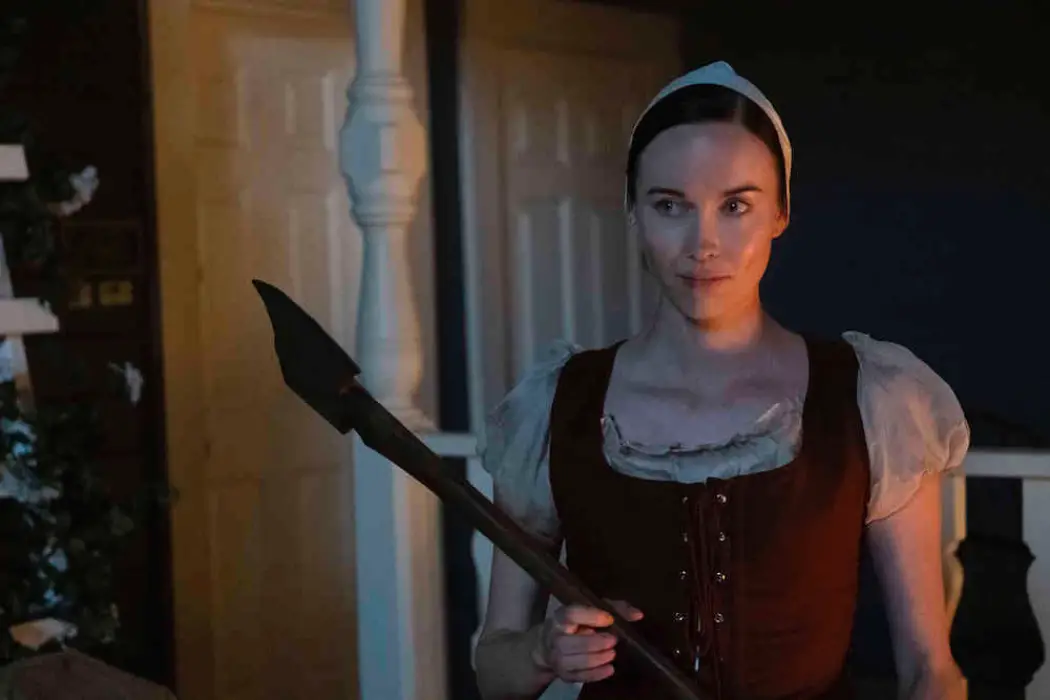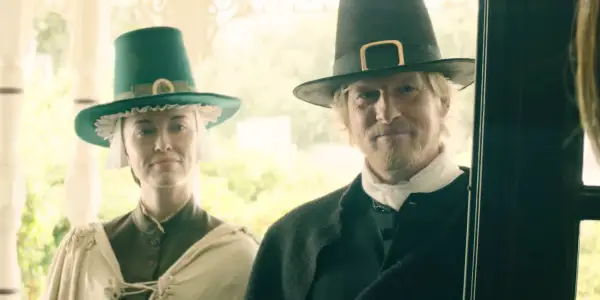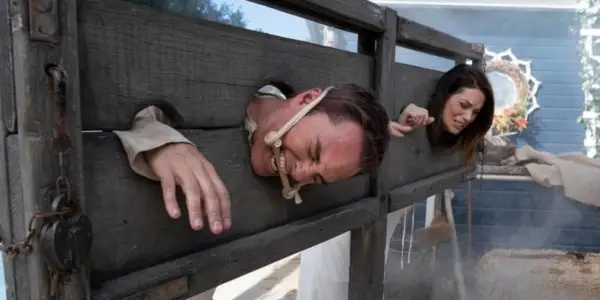Horrific Inquiry: PILGRIM (2018)

Stephanie Archer is 39 year old film fanatic living in…
Welcome back to the scariest, and at times goriest, column here at Film Inquiry: Horrific Inquiry. Twice a month, I will be tackling all things horror, bringing two films back into the spotlight to terrify and frighten once more. And occasionally looking at those that could have pushed the envelope further. Join us as we dive deep into the heart of horror, but warning, there will be spoilers.
“What are you afraid of? It’s just Thanksgiving.” – Pilgrim (2018)
We have all heard of a Christmas wish – but what about a Thanksgiving wish? For Hulu’s Into The Dark series, Pilgrim, by director Marcus Dunstan, this is the central catalyst of a pilgrimage gone terribly wrong. And while any other time Pilgrim would fail to land, with Thanksgiving right around the corner, it is the perfect horrific holiday watch.
It is easy to see why a film like Pilgrim was green-lit. There is horror in the zeitgeist of pilgrim Christianity, where every behavior and moment is based in the eyes of the Lord. Gratitude and appreciation are at the core of interacting with both one’s faith and with those around us. Never asking for more, while appreciating whatever we have. Taking this historical construct and inserting it within a modern framework was poised to create havoc. And while it does, it leaves much to be desired.
Gratitude
Pilgrim begins at thanksgiving dinner, the camera opening on the swinging of a small child’s feet, as the muffled argument between two adults fills our ears. We quickly deduce it is the parents of the small child that are fighting, their argument a final straw in their marriage. This argument will return as flashbacks throughout the film, driving hard the idea of the family on the holidays and a sense of “ungratefulness”. As we learn the small child is Cody (Reign Edwards), now a teenager, it also works to shape our perception of Cody, her behavior, and the resilience and strength of character.

The perceived ingratitude and unappreciative behavior is laid on thick for the audience early on. We watch the animosity between Cody and her stepmother Anna (Courtney Henggeler) unfold at the dinner table, all while Cody’s father Shane (Kerr Smith) is hyper-focused on his tablet watching the foreign markets. There is disregard and disrespect to go around, with only little brother Tate (Antonio Raul Corbo) escaping the fury. As the wishbone is broken, Cody makes a silent wish – all her animosity and resentment of her stepmother dooming them all.
Her wish is not immediately realized, the threat on Cody and her family slowly seeping into their home like a virus, multiplying one pilgrim at a time. First ushers in the arrival of Ethan (Peter Giles) and Patience (Elyse Levesque), their arrival at the home earlier than planned, but working to the advantage of Anna whose HOA party is a monthly tool to showcase a projected image of her home and her family. She is able to flaunt to the neighborhood her hospitality and understanding, as well as her gracious doting on one of the help.

As each instance of ungratefulness is exhibited, the mass of pilgrims grows. It swells until it literally consumes the family. At times brutal, too often cheesy. There is a reminiscent nature to the score that will draw audiences back to Children of the Corn, all while retaining the same made-for-TV movie feeling. And while the film totes a richness in is the premise, it fails to truly lean and commits at times.
Cult Mentality
Where Pilgrim may find strength in its premise surrounding gratefulness and appreciation, it also finds it in its cult examinations. When Patience and Ethan first arrive, there is a feeling as though they are brought back from the dead. As they are invited in, the camera closes in on their buckled shoes as they step beyond the threshold of the home. This framework for their arrival speaks to the paranormal. Yet, as the film progresses and the husked layers are peeled away, we see the kernel at its core. From the charismatic leadership of Ethan, this is far from the supernatural, but rather a cult utilizing the zeitgeist of the pilgrims to exact their perceived idea of gratitude, punishment, and murder.

Much of this cultist ideology and framework in Pilgrim starts to form with Ethan’s most devoted follower Patience. There is a complete and utter devotion to Ethan and his preachings, that even a screwdriver in the head can not deter. She is the literal definition of committing to one’s cult to the very end, becoming like the devoted follower at the end of Children of the Corn, fighting even when the leader has died. She is the literal representation of cult ideology that survives beyond the physical form.
Even as Ethan drops the act, becoming more of the modern-day man rather than a historical Pilgrim, the roots of belief are dug deep and he never wavers from his mission. There is an insanity that swells with the culminating cult, mimicking the lost sense of reality. The ideas of the cult have consumed its members as much as the modern ungratefulness they are fighting. So much so, it becomes their undoing.
Conclusion:
Pilgrim may not be that stand-out horror film you are looking for, but for the Thanksgiving theme, it is the perfect fit. A horrific holiday horror, Pilgrim has all the trimmings – both the good and the bad.
Watch Pilgrim
Does content like this matter to you?
Become a Member and support film journalism. Unlock access to all of Film Inquiry`s great articles. Join a community of like-minded readers who are passionate about cinema - get access to our private members Network, give back to independent filmmakers, and more.













